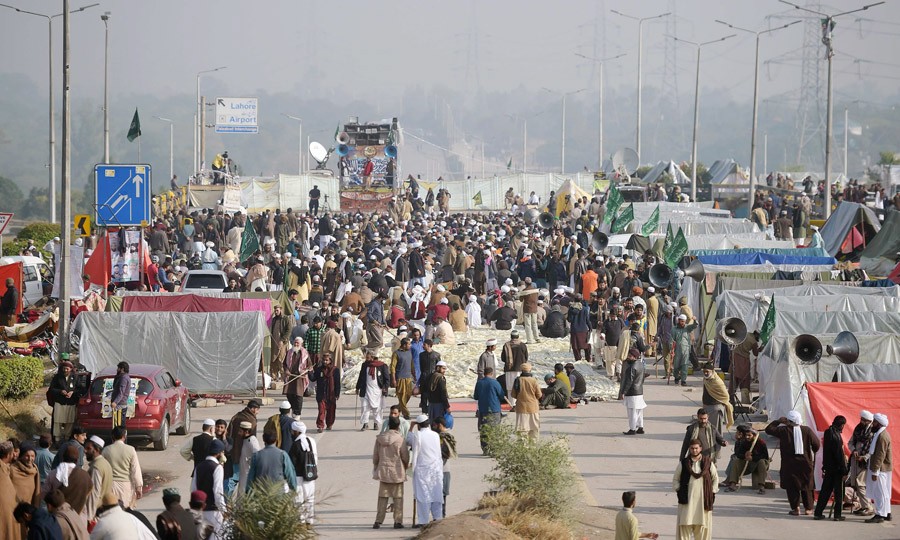
A political awakening is discernible within the Barelvi sect as the ongoing protests are the latest show of Barelvi activism to reclaim the lost political ground

Life has remained disruptive in parts of Islamabad and Rawalpindi for over two weeks thanks to choking of traffic by a section of hardcore Barelvi mullahs. First, it was in the last week of October that a Lahore-based Barelvi cleric, Dr Ashraf Asif Jalali, of the Tehreek Labbaik Ya Rasool Allah (TLYR), staged a sit-in near D-Chowk Islamabad. That protest ended on November 3. A follow-up to the first one, the second sit-in on the entrance of Islamabad at Faizabad Interchange, which has caused serious commuting problems for the residents of Islamabad and Rawalpindi since November 10, is led by another firebrand Lahore-based Barelvi cleric Allama Khadim Hussain Rizvi.
What explains Barelvi activism?
The role of religion in politics has been one of the enduring issues which has plagued Pakistan since the creation of the country. Unlike their Deobandi counterparts, who were allied with Indian National Congress and canvassed for the party in opposing the creation of Pakistan, Barelvi ulema overwhelmingly supported All India Muslim League (AIML) in the 1946 elections, the "…elections which held the key to the creation of Pakistan", as to quote Ian Talbot in his book Pakistan, a modern history.
According to Talbot, it was Biraderi (kinship group) networks, as led by Barelvi pirs, that played a pivotal role in mobilising people in Punjab to overwhelmingly vote for Muslim League. Nevertheless, Barelvi ulema have not remained politically as organised and assertive as their Deobandi variant. A change is in sight. It has already begun.
The immediate cause behind the sit-ins was the introduction of two changes in the controversial Election Act 2017. These changes have affected the Khatm-i-Naboowat (finality of prophethood) declaration, which public officeholders are required to make. Relating to a candidate’s belief in finality of prophethood of the Holy Prophet (PBUH), the words "I solemnly swear" were replaced by "I believe" and sections 7B and 7C of the Conduct of General Election Order, 2002 that deal with the status of Ahmadis were omitted. The former section states that the status of Ahmadis remains the same as under the Constitution. The latter section states that if an enrolled voter’s belief in finality of prophethood is contended, they shall have to reaffirm their belief in finality through a declaration failing which would result in their addition to the supplementary list of voters in the same electoral area as non-Muslim.
Thus, in the wake of the controversial act, protesters have been calling for the sacking of Law Minister Zahid Hamid even though changes in the act have been revoked.
In the long run, the underlying reason behind the sit-ins seems to be purely mundane: making political capital of religious arena. The Barelvi mullahs are capitalising on the crisis triggered by the incumbent government’s bid "to appease its Ahmadi citizenry", a matter which the National Assembly Speaker Ayaz Sadiq has unconvincingly attributed to a "clerical mistake".
These protests are the latest show of Barelvi activism in the political arena. A political awakening is discernible within the Barelvi sect led by ulema. Although the Barelvi school of thought, in all probability, is numerically stronger than its Deobandi counterpart, the former has not converted its numerical strength into its political might. Put differently, the Barelvi vote bank is immensely dispersed. Apparently, there seems to be a growing realisation among the ranks of Barelvi ulema that they have ceded much political ground to their Deobandi variant. Time, the ultra-religious sorts believe, is ripe to reclaim the lost ground.
Probably, it was Mumtaz Qadri’s legal trial and his subsequent execution which has helped the Barelvi sect coalesce. Back in March 2016, after Qadri was hanged in late February, Khadim Rizvi also led Fidayeen-i-Khatam-i-Nabuwat to D-Chowk under the banner of a coalition of several Barelvi groups called Tehreek-i-Labaik Ya Rasool Allah (TLYR).
According to the official site of Tehreek-e-Labaik Pakistan (TLP), the political variant of TLYR, headed by Khadim Hussain Rizvi, its objective is to make Pakistan an Islamic state through a legal and political process. Founded on August 1, 2015, TLP has contested two by-election in NA-120 Lahore and NA-4 Peshawar-IV, bagging more votes than Jamaat-i-Islami. The power and influence of pulpit has been playing itself out successfully.
Why are the Barelvi mullahs only protesting against the controversial changes in the Election Act 2017?
In Pakistan, there is compartmentalisation of Islam between the hardliners of Shia and Sunni schools of thought. Among Sunnis, further division lies between the more numerous Barelvis and Deobandis and less populous Ahle Hadees. The more hardcore elements among these schools of thought lay claims to protecting the honours of Islamic personalities. The Shia hardliner clergy consider the preservation of sanctity and honour of Ali’s family as their province. For the hardcore Deobandis, the protection and defence of the companions of the Prophet called Sahaba is their duty. Hardcore Barelvis stand, as they claim, for protecting the honour of the Holy Prophet (PBUH) and his family. The present controversy relating to amendment in election act perceivably impinges upon Barelvis’ province.
The use of religion for political purposes, a hangover from the colonial past, has only been divisive in Pakistan. Its genesis can be traced back to the final stages, especially 1946 elections, of the All India Muslim League’s struggle to found Pakistan. Legacies like old habits die hard; colonial legacies have only proven to be more resilient!